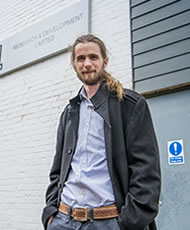Sam Birtwell MPhys Physics with Photonics, 2004, PhD Physics, 2009
Research Engineer, Gill Research and Development Limited

I design innovative new sensors for markets as diverse as motorsport, industrial machinery, aerospace, marine and meteorology. Contact with a wide range of application areas keeps things interesting and allows plenty of scope for new ideas to meet the diverse challenges.
The Physics and Astronomy department was one of the very few in the country offering the optics and photonics specialism I was interested in.
The subject knowledge I gained in both my MPhys Physics with Photonics degree and my PhD has been very important. In addition to this, my time at Southampton taught me the value of being able to acquire new knowledge independently. I also developed my ability to communicate my ideas through both internal and external conferences, which has been an enormously useful transferable skill.
Choosing a degree with a photonics specialism
I chose to study at Southampton because the Physics and Astronomy department was one of very few in the country offering the optics and photonics specialism I was interested in. This, backed up by the cutting-edge research in the department and in the Optoelectronics Research Centre, made Southampton the obvious choice. Following my Visit Day, I really liked the campus and the way the department worked, especially the lecturers’ enthusiasm for their subject.
My Southampton highlights
I remember the social life being excellent, with friendships being built up which have lasted to this day – including meeting my wife during my undergraduate course!
I was a founding member of LiveSoc (the live music society), formed to get musicians together and put live bands on in the Student Union – I believe the society is still going today.
I had a summer work placement at BAE Systems in my second year. I was also fortunate to have a summer placement in a research group in the ORC in the following summer, which was a great experience and led on to me pursuing a PhD.
The large percentage of lab work was very helpful in fully understanding the principles of what was being taught in lectures. Having very enthusiastic lecturers who were also conducting innovative research was also helpful. Being able to conduct my final year project from within a real research group was also a great experience.
My advice to current students
Make sure you enjoy yourself doing things outside of your degree. Realise that there are many skills to be acquired other than just your subject knowledge that will help you in your career. Try to get some kind of work placement relevant to the career you want to move in to, so that you gain some idea of how your subject is used in the working world.
To work in technology innovation, being open minded and flexible in your approach is just as valuable as your technical knowledge. You will need to be comfortable learning new things quickly and not afraid to leave your comfort zone in terms of acquiring knowledge in unfamiliar subject areas. While technical ability is important, enthusiasm and creativity will also be needed if you are to create truly innovative products.